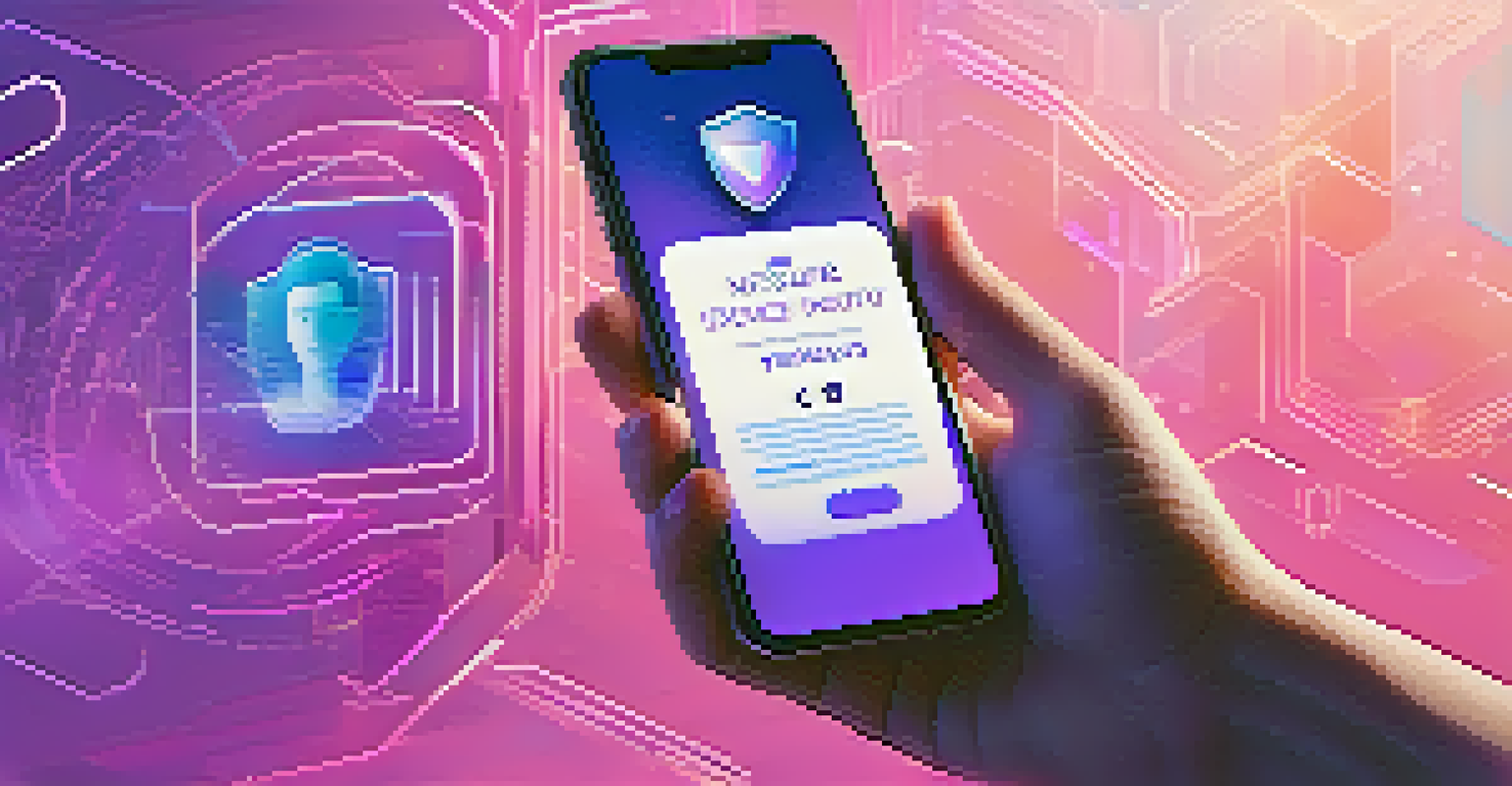NFTs as Proof of Identity: A New Era of Digital Verification

Understanding NFTs and Their Unique Properties
Non-fungible tokens, or NFTs, are unique digital assets verified on a blockchain. Unlike cryptocurrencies, which are interchangeable, NFTs can represent ownership of specific items or pieces of content. This uniqueness gives NFTs the potential to serve as a reliable proof of identity in the digital world.
Digital identity is a fundamental human right, and the power to control one’s own identity is essential in today’s world.
Imagine a digital passport that can't be replicated or altered; that's the essence of what NFTs offer. They come with inherent characteristics such as provenance and scarcity, making them ideal for establishing identity. By leveraging blockchain technology, NFTs ensure that every transaction and ownership transfer is transparent and tamper-proof.
As we dive deeper into the digital age, the idea of identity verification becomes increasingly challenging. With growing concerns about privacy and security, NFTs present an innovative solution that combines technology with trust.
How NFTs Can Enhance Identity Verification
NFTs can significantly streamline the identity verification process by providing a single, verifiable digital credential. Instead of juggling multiple forms of identification, individuals could use a single NFT that encapsulates all necessary data. This not only simplifies the process but also reduces the risk of identity theft.

For instance, a digital driver's license could exist as an NFT, easily accessible and secure. When presented, it can confirm your identity without exposing unnecessary personal information. This selective sharing capability puts users in control of their data, a crucial aspect in today’s privacy-focused world.
NFTs Simplify Identity Verification
NFTs provide a single, verifiable digital credential, streamlining the identity verification process and enhancing security.
Moreover, businesses can benefit from this technology by verifying customers or employees without the traditional, lengthy verification processes. The speed and security of NFTs can enhance user experience and build trust between parties.
Real-World Applications of NFTs in Identity Verification
Several industries are already exploring the use of NFTs for identity verification. For example, the travel industry could implement NFTs for secure boarding passes or vaccination proofs. This would not only enhance efficiency but also provide passengers with peace of mind regarding the authenticity of their documents.
Blockchain technology is not just a tool; it’s a revolution in how we think about trust and authenticity in the digital age.
In education, universities could issue NFTs as diplomas or certificates, enabling graduates to easily verify their credentials to employers. This would help combat diploma fraud, a growing concern in hiring practices today.
Additionally, social media platforms could use NFTs to authenticate profiles, reducing impersonation and ensuring genuine interactions. As more sectors adopt this technology, we could see a significant shift in how identity is managed online.
Challenges and Concerns with NFTs for Identity
Despite the advantages, there are challenges to implementing NFTs for identity verification. One primary concern is the digital divide; not everyone has access to the technology required to create or manage NFTs. This could lead to unequal access to opportunities and services.
Moreover, while blockchain technology is generally secure, it is not immune to attacks or vulnerabilities. A poorly implemented NFT system could expose sensitive data or even be hacked, undermining the trust it aims to build.
Real-World Uses of NFTs
Industries like travel and education are adopting NFTs for secure documents and credentials, improving authenticity and trust.
Lastly, there are regulatory and ethical considerations to address. How do we ensure that the use of NFTs respects individuals' rights and privacy? These are critical questions that need thoughtful answers before widespread adoption.
The Role of Blockchain in NFT Identity Verification
Blockchain technology is the backbone of NFTs, providing a secure and decentralized way to verify identities. Each NFT is recorded on the blockchain, which is a digital ledger that is immutable and transparent. This means once an NFT is created, it cannot be altered or deleted, ensuring a permanent record of ownership.
By utilizing blockchain, the verification process becomes more efficient. There’s no need for a third party to confirm identity; the blockchain itself serves as a trusted authority. This decentralization reduces costs and speeds up transactions, benefiting both individuals and organizations.
In essence, blockchain not only facilitates the creation of NFTs but also enhances their reliability as identity verification tools. The combination of NFTs and blockchain offers a compelling solution to the challenges of digital identity management.
The Future of NFTs and Digital Identity Verification
As technology continues to evolve, so too will the applications of NFTs in identity verification. The potential for smart contracts to automate and streamline the verification process could revolutionize how we authenticate ourselves online. This could lead to a future where identity verification is seamless and instantaneous.
Imagine a world where you can verify your identity with a simple click, whether for banking, travel, or social media, all thanks to NFTs. This would not only enhance user experience but also foster a safer digital environment.
Challenges in NFT Implementation
Despite their benefits, issues such as the digital divide and regulatory concerns must be addressed for widespread NFT adoption.
However, for this vision to become a reality, collaboration between technology developers, policymakers, and users will be essential. By addressing concerns and fostering innovation, we can pave the way for a new era of digital identity verification.
Conclusion: Embracing NFTs for Secure Identity Verification
In conclusion, NFTs present an exciting opportunity for enhancing identity verification in our increasingly digital world. Their unique properties, coupled with the security of blockchain, offer a reliable means of proving identity that can benefit individuals and businesses alike. As we navigate the challenges and opportunities ahead, embracing this technology could lead to significant improvements in how we manage our digital identities.
While there are hurdles to overcome, the potential for NFTs to streamline and secure identity verification is undeniable. With careful implementation and a focus on user rights, NFTs could become a cornerstone of digital identity in the future.

As we move forward, it's crucial to stay informed and engaged in discussions around NFTs and identity verification. The future is bright, and we have the chance to shape it together.